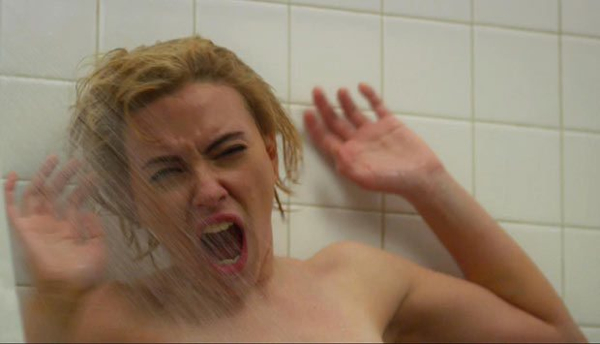Movie review by Greg Carlson
When Stephen Rebello’s “Alfred Hitchcock and the Making of Psycho” was published in 1990, cinephiles drooled over the riveting account of the landmark movie’s production history. Praised by fellow film historians and hardcore admirers of the Master of Suspense, Rebello’s work remains, more than two decades later, one of the most entertaining discussions of the construction, care, and feeding of a movie. A non-fiction film adaptation chronicling the events described in the book might have made the better choice as a theatrical motion picture, but instead we are left with Sacha Gervasi’s colorful, odd fabrication.
Fixing its gaze on the behind-closed-doors dynamics of long-married Alfred Hitchcock and Alma Reville, “Hitchcock” will never be mistaken for the precision-engineered narratives brought to life by the great filmmaker. Expectedly, Anthony Hopkins can’t quite escape the long shadow that comes with playing an iconic figure whose voice and physicality prove tough, if not impossible, to effectively crack. Helen Mirren keeps a straight face and fares better than her co-star, breathing some life into Alma’s position as the wounded, overlooked, and undervalued “behind every great man” device. The unfortunate surprise is that “Hitchcock” fails to burrow deep into “Psycho,” content instead to synopsize the most predictable and superficial anecdotes when it is not inventing fodder for the marital melodrama.
There are few things “Hitchcock” doesn’t manage to goof up, from the lurching shifts in tone to the ill-advised decision to bring Ed Gein to life as a phantasm that haunts Hitchcock’s dreams and stokes his anxieties about Alma. The broad portrayal of Anthony Perkins by James D’Arcy as a twitchy, closeted homosexual exploited for his “duality” would be simultaneously laughable and insulting, if Perkins wasn’t treated like a minor player. Scarlett Johansson’s Janet Leigh functions apparently to argue that Hitchcock wasn’t always a creep to his leading ladies, but Raymond Durgnat, whose “A Long Hard Look at Psycho” matches Rebello’s writing as the most detailed examination of the film to date, would likely have been disappointed that the filming of the shower scene comes and goes with little fanfare.
The most crushing disappointment of Gervasi’s film is twofold. First, the movie takes very little interest in the fascinating nuts-and-bolts details of the actual production process of “Psycho.” Hitchcock’s collaborators are given short shrift onscreen, feeding into the mythology of singular auteurism even as Alma at one point decries that very idea. Gervasi leaves out any really meaningful interactions with the likes of Saul Bass and Bernard Herrmann. Joseph Stefano sweats nervously in the surprising form of Ralph Macchio in one brief scene. Robert Bloch’s misfortunes in life translate to the fiction: he does not even appear as a character in the movie.
Second, the filmmaker wholly misjudges the necessity of a rotting red herring in Hitch’s suspicions of Alma’s flirtatious relationship with Danny Huston’s prowling Whitfield Cook – the previous Hitchcock collaborator who doesn’t even rate a mention in Rebello’s book. One can only imagine why Rebello, who provided rewrites to John J. McLaughlin’s script, would advocate for shifting attention away from “Psycho” to speculation about Alma’s fidelity. No saint himself (as a pile of starlet headshots in his study and a naughty peep through the wall of Vera Miles’ dressing room attest), Hitchcock is positioned in the movie as the victimized spouse when the dramatic focus might have been more effective and more accurate had the polarity been reversed.
